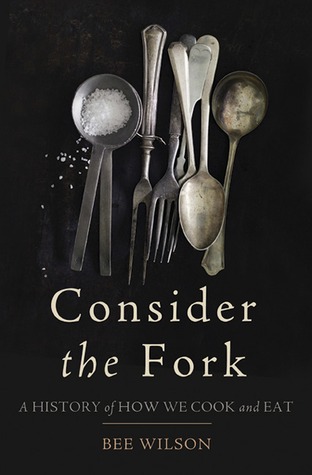I had heard great things about this book, but never thought I'd be
interested in a history of how we cook and eat. Well, Bee Wilson
showed me just how fascinating knives, refrigerators, and peelers can
be.
You might be thinking, "wut, that sounds so boring," but
believe me, it's anything but. Wilson takes us around the world and
across the centuries, exploring how different cultures have used such
technologies as forks, knives, spoons, graters, coffee-makers, and
saucepans to develop their own unique style of eating and serving
meals. We learn about the evolution of the hearth into the kitchen,
and how the Cuisinart was born when an American businessman with a
love of French cooking adapted a machine he discovered while visiting
the country.
With humorous anecdotes, confessions about her own cooking
experiences, and a keen eye for detail, Wilson takes us on a journey
filled with miraculous inventions and continuing mysteries- like,
say, how did people thousands of years ago first decide that roasting
meat over a fire was a good idea? Was it an accident? An experiment?
We might never know the answer, but speculating about it is still
fun. After all, the history of human food consumption and preparation
is linked to such areas of study as anthropology, the history of
science and technology, interior design, and many others.
Two
specific anecdotes were particularly interesting: first, that people
in medieval and Renaissance Europe used to carry around personal
knives in their belts for the purposes of eating and
defending themselves from possible attacks from enemies. Second, that
gas-powered
refrigerators
once existed. Yeah, seriously.
So
if you're interested in anything remotely having to do with the
history of food, manners, cooking implements, or human evolution,
check out Consider
the Fork
and bon appetit.

No comments:
Post a Comment